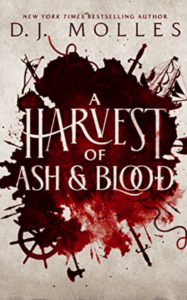An interesting thing has happened to the writer’s ecosystem. Not only are more writers self-publishing, creating a flooded marketplace where it’s easy to get lost and good quality stories are hard to find, but the prevalence of streaming services has also had a hand in this evolution: Consumers have come to expect more content from their favorite storytellers, and they want it faster.
As writers who are trying to survive and thrive in this new ecosystem, it’s become imperative that we figure out how to increase our productivity to keep up with the demand of our readers. But another challenge that rears its ugly head is this: How can we boost our productivity without sacrificing quality? How can we keep up with our content-hungry audiences without becoming purveyors of cheap, salacious tales that only amuse for a few moments and are quickly forgotten?
Here are five simple techniques that help me keep my productivity high, without turning my writing into soulless dreck:
(1) BICHOK (Butt In Chair, Hands On Keyboard):
If you’re unfamiliar, BICHOK means exactly what it says: Have your butt in your chair, and your hands on your keyboard, at the same time, every day. After all, you can’t expect to finish that novel you’re writing if you’re wandering about, waiting for the muse to strike you. Rather, sit down and start putting words on the page, and let that capricious muse come to you when it’s ready. This might seem a bit counterintuitive—won’t all my writing be dry and meaningless if I don’t wait for inspiration? But I find that the muse is more attracted to individuals who are already in position and working, than those who are wandering and distracted.
Consumers have come to expect more content from their favorite storytellers, and they want it faster.
It’s fairly standard advice, but invaluable and often forgotten. There’s so much to learn and master when it comes to the art and craft of writing, it’s easy to forget the basics—I do it myself all the time, and need reminders that, while learning and practicing new skills is important, so are the fundamentals. BICHOK is as fundamental as it gets. Same time, every day. Build the routine and adhere strictly to it, which, over time, will help you get in the headspace of writing—similar to sleep hygiene, where having a set bedtime routine primes your brain for sleep.
(2) Learn story craft:
When I talk about “story craft,” I’m referring to what you might call the “science” or “mechanics” behind good storytelling. Things like character archetypes, and different ways to plot your stories out (like the Hero’s Journey, though there are many different variations on that). Knowing the mechanics of character arcs and how stories work to deliver emotional payout to the reader is sometimes seen as unimaginative or formulaic. But just because you know them, doesn’t mean you have to follow them, point by point. After all, knowing the rules allows you to know which ones can be bent, and which ones can be broken—and when it’s appropriate to do either.
When it comes to increasing our productivity, knowing the mechanics of storytelling allows you to have a better sense of what’s going in your writing. This leads to less time trying to puzzle out how to make things work, and more time putting words on paper because you already know how they work. It has the added benefit of cutting down on editing time, as editing is largely trying to figure out how to take the creative slop of your rough draft, and hone it into a story that actually works. It’s awfully nice when your story works from the get-go.
When it comes to increasing our productivity, knowing the mechanics of storytelling allows you to have a better sense of what’s going in your writing
One of my favorite resources for learning story craft is K.M. Weiland’s podcast, Helping Writers Become Authors. She’s highly informative, but keeps it simple and easy to understand. Which is important for Neanderthals like me.
3. Outline:
This is a perennial hot-button issue amongst writers. And I’ll be the first to admit, outlining is not for everyone, and also not for every story. But if you’re finding yourself spending a lot of your writing time sitting there and thinking about where to take your story next, you might want to consider doing some outlining. One of the biggest benefits of outlining that I’ve found is that it allows me to know what the plan is for that writing session BEFORE I sit down to write, which equals—you guessed it—less thinky-thinky and more typey-typey.
4. Classical conditioning:
Reward yourself for sitting down and getting words on the page. Just like training a dog, you’re trying to elicit a desirable action (for the dog, it might be to sit and stay, but for you, it’s sit and put words on the page), by creating a positive association with the activity. With dogs, that positive association almost always comes from food, but like a lot of folks, I personally have to watch my midsection, so I prefer something like nicotine. Now, I’m not saying you should go off and become addicted to nicotine—just being honest about what I use to create a positive association with writing. Without that positive association, I find that my writing sessions will slowly slide from “Oh, this is fun!” to “Crap, this is a chore.” Not only do we writers tend to produce a lot more when we’re having fun, but if you’re NOT having fun writing it, I can almost guarantee no one is going to have fun reading it.
And, whatever you choose, there is an additional benefit: Starting your writing session with that positive association contributes to the routine I compared to sleep hygiene in #1. When you have that hit of caffeine, or a dose of nicotine, or whatever you choose to treat yourself with, you’re basically sending a signal to your brain: “Hey! It’s writing time!”
5. Give yourself time to think:
It’s easy to get caught up in doing-doing-doing, especially in today’s hustle culture. But we have to remember that, as writers, busyness is not our business. In order to write it, we must first think it. Back when I worked full-time as a police officer while also trying to become a full-time author, I used my hour-long commute to do this—turn off the radio and let my mind run. By giving yourself the time to sit around and ponder the Universe, you’ll find yourself feeling full of words when it comes time to write, rather than feeling empty. Plus, it’s relaxing, just giving yourself permission to sit and stare off into nothing.
Do you have any producity-boosting secrets to share? C’mon, head over to Facebook and let us know!
 D.J. Molles is the New York Times bestselling author of the Remaining series and the bestselling Lee Harden series. When he’s not writing, he’s taking steps to make his North Carolina property self-sustainable, and training to be at least half as hard to kill as Lee Harden.
D.J. Molles is the New York Times bestselling author of the Remaining series and the bestselling Lee Harden series. When he’s not writing, he’s taking steps to make his North Carolina property self-sustainable, and training to be at least half as hard to kill as Lee Harden. He also enjoys playing his guitar and drums, drawing and creating things, loving on his dogs, and spending time with his wife and three children. His latest title, A HARVEST OF ASH & BLOOD is available for Pre-Order Now!
He also enjoys playing his guitar and drums, drawing and creating things, loving on his dogs, and spending time with his wife and three children. His latest title, A HARVEST OF ASH & BLOOD is available for Pre-Order Now!





